Anxiety and Yoga
October 29, 2023 - Smart TMS

In a fast-paced world filled with stressors and demands, anxiety has become a prevalent mental health issue affecting millions of people worldwide. Fortunately, there are natural and holistic approaches to managing anxiety that don’t rely on medication alone.
Yoga and exercise have emerged as powerful tools to combat anxiety, offering both mental and physical benefits.
In this article, I will explore the science of anxiety, the basic tenets of yoga, and the evidence supporting it as an effective anxiety intervention.
The Science of Anxiety
Individuals grappling with anxiety often find themselves trapped in an endless cycle of excessive worry, fear, and tension. These emotional experiences of anxiety are accompanied by several physical symptoms, such as accelerated heart rate, muscle tension, shallow and rapid breathing, and a heightened state of alertness. These bodily responses are the result of the body’s intricate stress response system, which is designed to prepare us to react quickly in the face of perceived threats—a mechanism often referred to as the “fight-or-flight” response.
Clinical research has delved into the physiological underpinnings of anxiety, revealing intriguing insights into the body’s stress response. Studies have consistently demonstrated that individuals with clinical anxiety disorders tend to exhibit significantly elevated levels of cortisol—a hormone produced by the body when in high-stress situations [1]. Cortisol plays a crucial role in regulating various bodily functions, including metabolism and immune response. In anxiety, the body’s cortisol production can become dysregulated, contributing to the ongoing experience of heightened stress.
Moreover, research has also pointed to the involvement of cytokines, a group of proteins produced by the immune system as part of its response to infection, injury, or stress [2]. Elevated cytokine levels have been observed in individuals with clinical anxiety, suggesting a complex interplay between the immune system and the brain in the development and experience of anxiety disorders. These findings underscore the intricate relationship between the mind and body in the experience of anxiety, highlighting the importance of holistic approaches like yoga and mindfulness to address both the mental and physical aspects of this condition.
Yoga: History and Key Tenets
Yoga has a rich history dating back thousands of years in India, rooted in the idea of uniting the individual self with the universal consciousness. Its core philosophy is detailed in Patanjali’s Yoga Sutras, which includes moral guidelines, physical postures, breath control, and meditation, among other practices. Over time, yoga has become a global phenomenon, celebrated for its ability to create harmony between the mind, body, and spirit, and for its potential to deepen the practitioner’s connection with themselves and their experiences [3].
In the context of anxiety, yoga is believed to offer profound benefits. Its emphasis on breath control, mindfulness, and physical relaxation is thought to help activate the body’s relaxation response, reducing physiological symptoms like increased heart rate, muscle tension and shallow breathing. Moreover, yoga’s holistic approach can potentially address not only the symptoms but also the underlying causes of anxiety, promoting overall well-being and mental clarity [4].
Yoga & Anxiety: Evidence
Several research studies and systematic reviews provide substantial evidence supporting the effectiveness of yoga in reducing anxiety. One analysis found that yoga was effective in both short-term and long-term anxiety reduction for individuals with non-clinical anxiety (people who have not been formally diagnosed with an anxiety disorder). This analysis also found yoga to be effective in the short-term reduction of anxiety for those with a formal diagnosis, but less so in the long term [5].
Another scientific review of 27 different studies focusing on yoga as either a primary or secondary intervention showed that 19 of those studies found significant reductions in both physical and mental symptoms of anxiety [6]. Further research has shown yoga to be as effective as medication at reducing symptoms of anxiety and depression, and a combined treatment of yoga and medication to be more effective than medication alone [7]. One study looking specifically and the biochemical relationship between yoga and anxiety found that yoga effectively reduced the physiological markers of anxiety, such as high blood pressure, elevated heart rate, cortisol levels, and cytokine production [8], suggesting that yoga’s benefits can be both physical and psychological.
These findings have been supported across every age group and gender. Several studies specifically focused on children and adolescents, showed that yoga was an effective intervention for anxiety in both the short and long term, and was superior to other holistic practices such as mindfulness and meditation [9,10]. Other research has found yoga to be more effective at reducing symptoms and anxiety and depression than other forms of exercise in elderly populations, as well as improving cognitive function [11]. Gender-specific research on yoga has shown it to be effective at reducing physical and mental symptoms of anxiety and depression in both women [12,13] and men [14].
Conclusion
In conclusion, the science of anxiety has illuminated the intricate relationship between our minds and bodies, revealing how the body’s stress response system can become dysregulated in the face of excessive worry and tension. The physiological markers of anxiety underscore the complexity of this condition. However, amidst this complexity, the ancient practice of yoga offers a powerful tool to combat anxiety. Its emphasis on breath control, mindfulness, and physical relaxation activates the body’s relaxation response, alleviating the physical symptoms of anxiety. Moreover, through its holistic approach, yoga’s capacity to address both the symptoms and underlying causes of anxiety promotes overall well-being and mental clarity.
A wealth of scientific evidence supports the effectiveness of yoga in reducing anxiety across age groups and genders. From children to the elderly, yoga has consistently demonstrated its potential to enhance mental and physical well-being and should be promoted as an effective intervention. Whether used alone or in conjunction with medication, yoga proves itself as a versatile and potent tool for managing anxiety.
Author, Adam,
Smart TMS St Albans Practitioner










